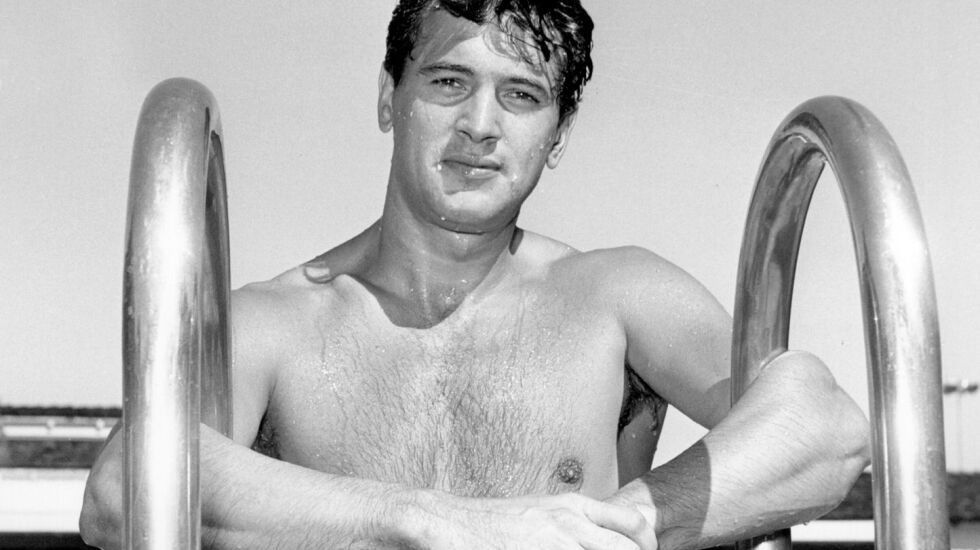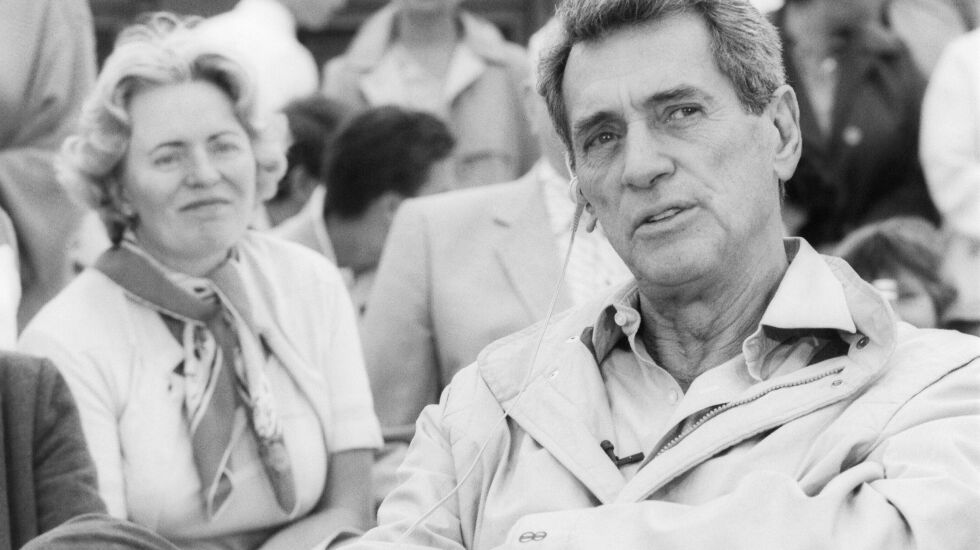
In a 1952 feature in Photoplay magazine titled “Bachelor’s Bedlam,” readers were given an “insider’s view” into the home lives of actors Rock Hudson and Bob Preble, who lived in a one-bedroom, one-bed apartment off Mulholland Drive. Reads one photo caption, “[W]hile Rock hates the ring of the telephone, Robert enjoys conversations with girlfriends.”
Cut to 1955, by which time Hudson had become one of Hollywood’s top stars but had yet to settle down, prompting tabloid articles with entries such as, “Fans are urging 29-year-old Hudson to get married — or explain why not.” A few days shy of Hudson’s 30th birthday, he wed his agent’s secretary, who divorced him three years later. It was back to the bachelor’s life for Rock Hudson.
From today’s perspective, it seems almost ludicrous that the general public fell for such charades. In Hollywood, virtually everyone in the business knew Hudson was gay, but as we’re reminded in the HBO documentary “Rock Hudson: All That Heaven Allowed,” the Winnetka native who became a Hollywood Golden Age leading man kept his private life to himself for decades, until he essentially no longer had a choice.
We know the story of Hudson’s early days in show business, his ascendancy to stardom and his tragic death at the age of 59 from AIDS, and yet director Stephen Kijak (“Stones in Exile,” “Sid & Judy”) delivers a valuable, respectful and comprehensive documentary filled with clips from Hudson’s most memorable roles (and some you might have forgotten) as well as a treasure trove of archival film footage, and interviews with former co-stars and longtime friends.
“All That Heaven Allowed” also employs (and sometimes overdoes it with) the technique of playing clips from Hudson’s films that take on a whole new meaning when juxtaposed with his private life. Examples: Hudson’s Capt. Jeffrey Claybourne in 1954’s “Bengal Brigade” saying, “I can’t marry you … for a moment I forgot what I am”; or Leslie Caron in 1965’s “A Very Special Favor” telling Hudson, “Hiding in closets isn’t going to cure you.” It’s a conceit we’ve seen in the recent Michael J. Fox documentary — and it was the entire premise of the 1992 documentary “Rock Hudson’s Home Movies” — and while it can be effective, it also becomes a bit wearisome.
With Laura Karpman’s jazzy score setting the mid-20th century tone, “All That Heaven Allowed” harks back to a time when the studios were all-powerful, and men such as the influential and manipulative agent Henry Willson groomed a myriad of young hopefuls, developing the “beefcake craze” of the 1950s and handing out names such as Ty Hardin, Race Gentry, Guy Madison, Buck Class, Troy Donahue, Tab Hunter, and yes, Rock Hudson, who was born Roy Harold Scherer and then took the name Roy Fitzgerald when his mother remarried. In an audio recording from a 1983 interview, Hudson says, “I wanted to be an actor all my life … [but] I could never freely say I wanted to be an actor … because that was sissy stuff.”
Former co-stars such as Piper Laurie and Kathleen Hughes talk sympathetically about working with Hudson in his early days when his imposing physique and chiseled handsomeness resulted in him playing one relatively stiff hunk after another in adventure films. It was the Douglas Sirk melodrama “Magnificent Obsession” in 1954 that catapulted Hudson to the next level, and Hudson’s searing, Oscar-nominated performance in “Giant” (1956) that solidified his standing as not only a major star but an actor of considerable gifts. (Hudson, on co-star James Dean: “I didn’t particularly like him, personally.”)
Through the 1960s and 1970s, Hudson experienced the usual ups and downs (he gave one of his best and most surprising performances in the disturbing sci-fi thriller “Seconds” in 1966), eventually segueing to a successful and lucrative TV career with shows such as “McMillan & Wife.” The actress and filmmaker Illeana Douglas notes that from the time Roy Fitzgerald changed his name to Rock Hudson, he was playing the role of Rock Hudson for the duration of his life.

Friends and former romantic partners talk about how Hudson was free-spirited, warmhearted and completely comfortable in his own skin when the cameras weren’t on and the press wasn’t around — but Hudson remained in the closet, as did virtually every gay artist of the time. With “All That Heaven Allowed” following a linear timeline, we know the last chapter will be tragic, with Hudson’s appearance deteriorating rapidly after his HIV/AIDS diagnosis in 1984, and the tabloid press in a continued frenzy and speculating about his condition and illness until the following summer, when his French publicist read a statement confirming he had AIDS.
On Oct. 2, 1985, Hudson died at his home in Beverly Hills. The documentary notes that by being the first major celebrity to contract HIV and to eventually go public with his condition before passing away, Hudson helped raise awareness of the virus at a time when the Reagan administration was painfully, horrifically slow to take action.
We’re left with the feeling that while Rock Hudson enjoyed an often-spectacular career and a rich and full and glamorous life, the real Roy Fitzgerald was never able to truly emerge from the shadows. The world wouldn’t allow it.







